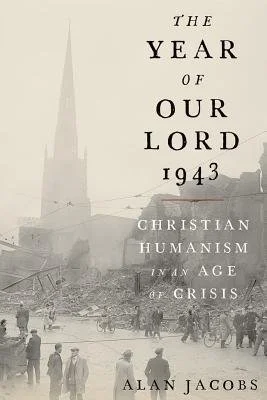By Alan Jacobs
If I were to re-read two books whose pages captured my mind in 2021, The Year Of Our Lord 1943: Christian Humanism in an Age of Crisis would be one of them.
Why?
This book stretched me. Published in 2018, The Year Of Our Lord 1943 introduced me to Christian intellectuals of the 20th century I did not know (Jacques Maritain, W.H. Auden, and Simone Weil) and helped me get better acquainted with others I did (T.S. Eliot, C.S. Lewis). I had to put my thinking hat on! The Year Of Our Lord 1943 was not a "quick write" for the author; it was not a "quick read" for me.
This book reiterated the importance of familiarity with the past to avoid the pitfalls of the present. Masterfully, as only a scholar can, Alan Jacobs demonstrates ties between what his "intellectual five" saw in the war-torn year of 1943, and the implications for post-war Western democracy. More importantly, Jacob clarifies the implications for us today: the implications for twenty-first century education, human rights, and the role Christians and Christianity can (should?) play in society.
There are 250 pages of references to writers, their times, their works, and why those works matter then and now. Drawing on one or two to demonstrate Jacobs's ability draw a line between past and present is challenging, but here goes. On January 15, 1943, W.H. Auden gave a lecture entitled, "Vocation and Society," in which he encouraged students to be wise, not just to become wise to graduate cum laude. Remember, the year is 1943 and Auden is setting the necessity of vocation against the impossibility of such in state-controlled fascism. Jacobs writes:
Auden's vision, then, is of a vocation-based education sustained by a democratic polity, and a democratic polity sustained by Christian faith. The vision stood (as did Maritain's in Education at the Crossroad, as did Lewis's in The Abolition of Man) against the commanding power of the nation-state, against pragmatism, against modern technocratic canons of efficiency--against Weil's Social Beast (click here for more on Jacobs and Weil's Social Beast) (148).
In chapter 6, Jacobs draws on Jacques Maritain, Lewis, and Weil encouraging educators to recognize that their warnings about "the cultural collapse of Europe" apply today, not for fear of repeating the same mistakes (Ecclesiastes 3:9 applies), "but because they may well commit others that arise from the very different but equally heedless momentum of their society" (129).
That is, what Americans need to learn from Europe’s catastrophe is the danger of failing to cultivate intellectual and spiritual aspirations beyond what one's everyday culture encourages. In Europe, what had primarily impeded genuine education was a false and ultimately poisonous model of group identity -- as manifested, for instance, in the belief in an intrinsically “German physics“ that had led the Nazi regime to expel most of its Jewish scientists. In America, the chief impediment to genuine education was technocratic pragmatism. Both paths led, in their different ways, to the death of deep education and therefore, ultimately, to the death of genuine human culture (129).
This book helps quell the urge toward sweeping generalizations. Reading Jacobs is to be reminded that "it's a little more complicated than that." He examines the works of five thinkers in one year and from their disparate lives demonstrates the threads of unified thought and warning. Masterful!
Recommendation:
Any temptation I have to give The Year Of Our Lord 1943: Christian Humanism In An Age Of Crisis less than five stars stems from my unwillingness to think deeply, process carefully, evaluate consistently, and apply fairly. As I have noted, this was a hard read, not because it was poorly written but because Jacobs took me places I have not been before to listen to thinkers I have not heard before and forced me to grapple with ideas I have not processed before. Now to figure out when I am going to once again crack open this book, take a deep breath, and dive in a second time!

